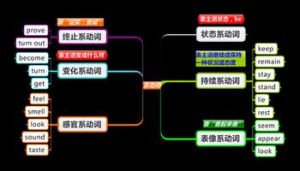定義
半系動詞就是相當於be的動詞,可以替換純系動詞。用於連線主語和表語,說明主語的狀態、性質特徵或身份等。
分類
半系動詞後可用名詞、不定式、分詞和形容詞等作表語,這類詞有:
1.表感官的系動詞:look, sound, notice,taste, smell, feel(這些詞用形容詞作表語)
2.表似乎的系動詞seem, appear
3.表變化的系動詞:become, get, turn, grow, make, come, go, fall, run
4.表依舊的系動詞:remain, keep, stay, continue, stand, rest, lie, hold
5.可帶名詞作表語的系動詞:become, make, look, sound, fall, prove, remain, turn(該詞後接的單數名詞前多不用冠詞。如:He turned teacher.)
如果讀者對於這個語法現象還是不怎么理解的話,可以以這個名句為例子學學:the man who dies rich dies disgraced.在巨富中死去,是一種恥辱。其中的rich and disgraced 是說明主語的性質的。
狀態系動詞
用來表示主語狀態,只有be一詞,例如:
He is a teacher.他是一名教師。(is與補足語一起說明主語的身份。)
持續系動詞
用來表示主語繼續或保持一種狀況或態度,主要有keep, rest, remain, stay, lie, stand, 例如:
He always kept silent at meeting. 他開會時總保持沉默。
This matter rests a mystery. 此事仍是一個謎。
表像系動詞
用來表示"看起來像"這一概念,主要有seem, appear, look, 例如:
He looks tired. 他看起來很累。
He seems (to be) very sad. 他看起來很傷心。
感官系動詞
感官系動詞(以描述感覺為主的詞)主要有feel, smell, sound, taste, 例如:
This kind of cloth feels very soft.
這種布手感很軟。
This flower smells very sweet.
這朵花聞起來很香。
變化系動詞
這些系動詞表示主語變成什麼樣,變化系動詞主要有become, grow, turn, fall, get, go, come, run.
例如:
He became mad after that. 自那之後,他瘋了。
She grew rich within a short time. 她沒多長時間就富了。
終止系動詞
表示主語已終止動作,主要有prove, turn out, 表達"證實","變成"之意,例如:
The rumor proved false.這謠言證實有假。
The search proved difficult.搜查證實很難。
His plan turned out a success. 他的計畫終於成功了。(turn out表終止性結果)
注意:可帶名詞作表語的系動詞be, become, make, look, sound, fall, prove, remain, turn後接的單數名詞 前多不用冠詞。
2.系動詞無被動語態:
appear, be become, fall, feel, get, grow, keep, look, remain, seem, smell, sound, stay, taste, turn
如: It sounds good.
實例解析
半系動詞通常可以和形容詞連用,有些半系動詞可以和介詞短語或asif等連詞連用。現將半系動詞分為四類進行討論。
1、“感官動詞”類:look feel smell taste sound等,例如:
(1)The story sounds_______.(MET89)
A.to be true B.as true C.being true D.true
(2)Those oranges taste_______.(MET91)
A.good B.well C.to be good D.to be well
(3)--Are you feeling_______ (NMET92)
--Yes I'm fine now.
A.any well B.any better C.quite good D.quite better
(4)--Do you like the material
--Yes it______very well.(NMET94)
A.is feeling B.felt C.feels D.is felt
(5)--How are you today
--Oh I______asillasIdonowforaverylongtime.
(NMET2000)
A.didn'tfeelB.wasn'tfeeling
C.don'tfeelD.haven'tfelt
(6)--Youdon'tlookvery______.Areyouill
--No I'mjustabittired.(北京春招2003)
A.goodB.wellC.strongD.healthy
(7)Themanwefollowedsuddenlystoppedandlookedasif
______whetherhewasgoingintherightdirection.
(2003春招)
A.seeingB.havingseenC.tohaveseenD.tosee
解析 此七題的答案分別是DABCDBD。此類半系動詞通常可以直接搭配形容詞或like或asif等結構。此類半系動詞一般不使用進行時或被動語態。第(7)題的asif後實際上省略了hewanted.
2、“狀態變化”類:get turn go come become grow fall make等,例如:
(1)--Howlong_____eachotherbeforethey______married
--Foraboutayear.(NMET93)
A.havetheyknown get
B.didtheyknow weregoingtoget
C.dotheyknow aregoingtoget
D.hadtheyknown got
(2)Cleaningwomeninbigcitiesusuallyget_____bythe
hour.(NMET98)
A.payB.payingC.paidD.topay
(3)Aswejoinedthebigcrowd Igot______frommy
friends.(NMET2001)
A.separatedB.sparedC.lostD.missed
(4)Becarefulwhenyoucrossthisverybusystreet.Ifnot
youmay______runoverbyacar.(北京春招2002)
A.haveB.getC.becomeD.turn
(5)--Howaretheteamplaying
--Theyareplayingwell butoneofthem______hurt.
(2002春招)
A.gotB.getsC.areD.were
解析 此五題的答案分別是DCABA。由此可見get後搭配過去分詞構成系表結構是非常常見的一種搭配形式。它常表示一種狀態,不強調動作。
3、“保持不變”類:stay lie stand keep remain continue等,例如:
(1)Havingatripabroadiscertainlygoodfortheold
couple butitremains______whethertheywillenjoyit.
(NMET2002)
A.toseeB.tobeseenC.seeingD.seen
(2)--Mummy canIputthepeachesinthecupboard
--No dear.Theydon't______well.Puttheminthe
fridgeinstead.(2002北京春
招)
A.keepB.fitC.getD.last
(3)Whydon'tyouputthemeatinthefridge
Itwill______freshforseveraldays.(NMET2003)
A.bestayedB.stay
C.bestaying
D.havestayed
解析 此三題的答案分別是BAB。此類半系動詞後常搭配形容詞、副詞或不定式結構。

